|
|
| 'Like' us on Facebook | Follow us: |
Posted on: July 01, 2015
Building a Sacred Future Through Our Children
When the Lord comes in our midst there are two important aspects to His descent that stand out among others. One is His powerful and enchanting presence, which has the potency to transform and raise all who comes to Him. Everyone who comes to Him benefits, some considerably and few immensely, depending on one’s receptiveness. The other aspect is the message that He brings, and this has some unique benefits of its own. Adherence to the message has the power to manifest the Lord in one’s life. A tryst with Divinity could be a blessing for good acts of the past, but it is in loyalty to the message that one completely benefits and finds redemption, and also a means to express one's devotion to the Lord. So it is indeed of paramount importance for each of us to dwell on His message.
As part of the 90th Birthday offerings, we will begin every month from with excerpts of a discourse from the Golden Jubilee Birthday Celebrations of Bhagawan. During the grand 50th Birthday celebrations, Baba gave discourses specific to the Seva wing and the Bal Vikas wing, apart from discourses revealing His own message and mission. The excerpts presented below are from the discourse Baba gave on 19 Nov 1975. This is the second part of the article published last month, with more clips from the same discourse. Let us listen and re-listen, read and re-read even as we imbibe the essence contained.
In the previous part of this series we heard clips from a discourse delivered on 18 Nov 1975. In this part we bring you few more excerpts from the same discourse. The theme of the article last week was more to do with what true education is and how secular education must inspire inquiry in the student. Swami explained, even spiritual education, at best can call your attention to the ultimate Truth but cannot lead to the merger with it. Bhagawan explained that only Tapas can confer that final consummation. He then went on to define beautifully the true meaning of Tapas, which is, the unity and purity of thoughts, words and actions. Completing the topic Bhagawan declared that such purity is easy for one who develops selfless love. In an age where an attempt is being made to keep education and excellence in profession far apart from values such as love and selflessness, this indeed is an insightful message to the gathered Bal Vikas gurus (the discourse was delivered as part of the Bal Vikas Gurus’ conference). In the excerpts we shall go through in this article, Swami goes to the root of the problem – the reason for the education today not serving the holy purpose it is meant to.
What does it take to make education so sacred and holy? In what sort of an environment can the exchange of spiritual education take place? Bhagawan explains that for such a sacred exchange, both the receiver and the giver must be elevated. Especially a lot depends on the teacher. Swami tells us what should be the nature of a Guru, for the Guru to be an imparter of true education.
Gurus should be such that, they win over the minds and the hearts, they should not be such that, they win over the wealth (of the students). To the extent possible we must try to follow the description of the relationship between a Guru and a disciple as given in the Vibhuti yoga of Bhagavad Gita. Krishna and Arjuna are both ideal individuals. In this, Guru (Krishna) is an Avatar. Arjuna (disciple) on the other hand, is a man of great strengths that were acquired through tapas. Here the disciple is Narottama, the best among men, and the teacher is Purushottama (God). When such a teacher and disciple come together, naturally it would be possible for you to comprehend and acquire spiritual education. But today it is neither possible to have such Gurus, nor it is possible to have such disciples. Guru's orders are not being followed by the disciples. Instead, as a result of the Kali age the disciple wants the Guru to accept the orders that emanate from him. When the Guru is not ready to accept the injunctions given by the disciple, then the disciple plans to have a 'no-confidence motion' against the teacher. In such a situation, how can we enjoy and appreciate the great tradition of our country Bharath?
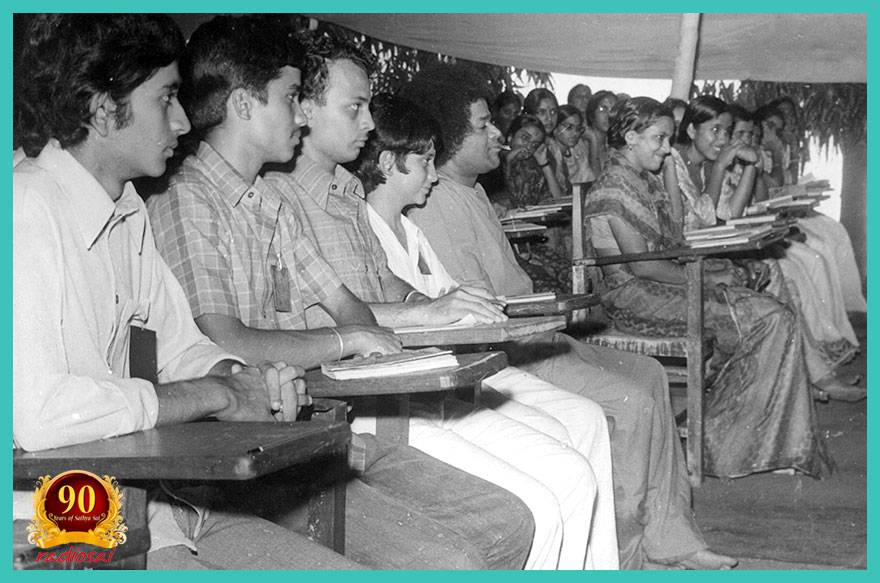 |
The first and foremost problem of our education system is the commercialisation of it. As Swami said in the previous clip, it is difficult for a teacher to impart to the students the true ideals when the teacher has an eye on the remuneration or the exchange of knowledge becomes a business deal. When that happens, there are two commodities being exchanged, one is education and the other money. And as more importance is given to money, now in the student-teacher relationship, the student becomes the giver and the teacher the receiver. In such a scenario, the student chooses and demands what he wants. Interestingly, this was precisely the point Bhagawan made when He announced that His colleges and schools will charge no fees. He said while talking to the staff one day in the portico of the mandir in Prasanthi Nilayam, “If we take money from the students, we have to give them what they ask for. When we give education free, we can give them what has to be given!” Bhagawan goes on to describe, why an education system based on money cannot impart sacred learning.
In the old days the only connection which bound the disciple and the teacher was love. Today however, the relationship between a Guru and a disciple is based on money. Only when the disciple pays money, the teacher gives education. The month the student fails to pay the fees, that month the teacher does not teach him. How can education which is so intimately connected with money be permanent? We should regard education as related to good qualities. The education that comes and goes with money is not permanent. When money itself is not permanent, how can education which comes with that money be permanent? It is only when we pursue the ways relating to making a living through love, money too would be easily attainable.
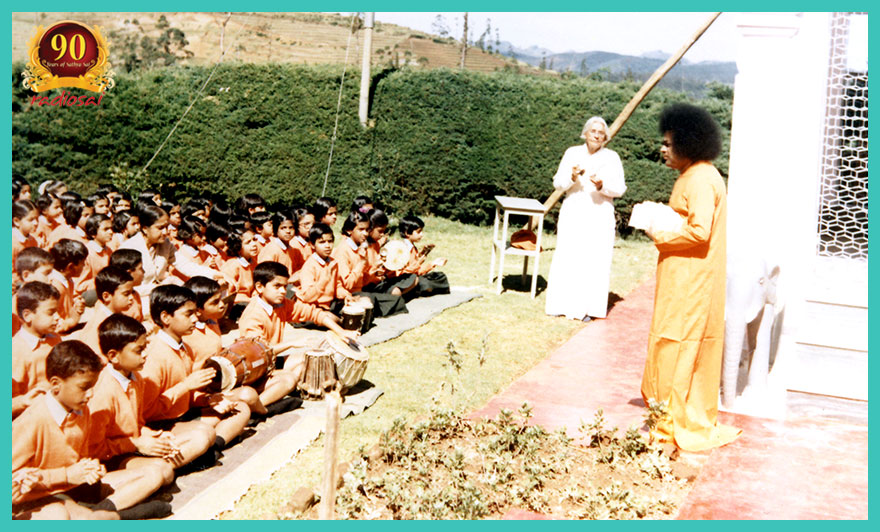 |
Though a significant part of the onus for this deterioration in the education system lies in commercialisation, the problem could be traced to a deeper cause. This can be recognised through a close observation of the change in our attitude itself. Why would any society wish for a system that is injurious to the progress of the society? The only cause for a system’s failure could be wrong prioritisation of the individuals in the society. But in this scenario, whose error of judgement is it? Bhagawan explains in the clip to follow.
Teachers and gurus! It can be said that the elders are responsible for this most unfortunate situation today. Mothers today don’t care for their own child, they don't make any effort to foster them, and instead hand over the babies to servant-maids and go about freely looking after their own interests. When the child becomes two or three year old, and has barely even seen the face of the mother, the child would be put in a convent. From the convent, they go into high school and college, in the process they are in the unfortunate predicament of never experiencing the mother's love in their whole life. They are unfortunate as they do not know what mother's love and affection is. Such a child is ready to weep when the Aaya (caretaker) dies, but not when the mother dies. In such scenario, is there any relevance for the maxim: Matru devo bhava, Pitru devo bhava? (Revere your mother as God; revere your father as God).
If we turn our attention now to the educational institutions, we find that the teachers are descending to even lower levels. It is from the teacher that many bad qualities, ideas and practices are being handed over to the student. It is because the teachers are not ready to conduct themselves in an exemplary manner in the presence of the students, the students are also taking the bad path. They are indulging in such practices, which have no connection whatsoever between the Guru and the disciple. They make no attempt to give noble ideas to the minds of these young people. If teachers become ideal, be it students or children in general, they are sure to become worthy citizens of Bharath in the future. There is a need for parents too to assist teachers to an extent. But these days, even if the teacher tries to inculcate some sacred feelings in the students, the parents go and discourage the teacher. In such a scenario, since the teacher too wants to make a living, he changes his own ideas and ideals taking the path prescribed by the parents. On the whole, we can state that the mother, father and teachers are the reason for the young children to go astray.
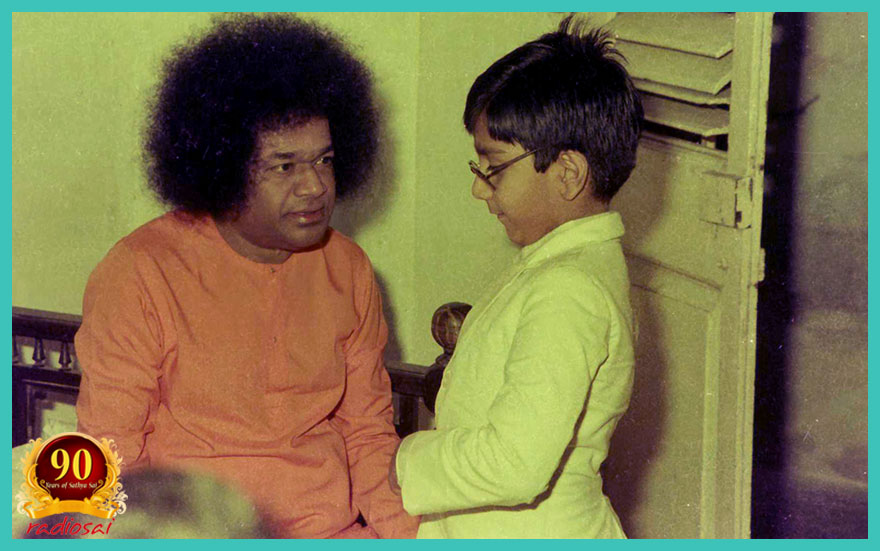 |
It is said that the mother is the first teacher, no wonder Swami refers to the lack of care from mothers today as an important cause for problems in the society. It cannot be said that mothers don’t care for their children at all, and one could say with confidence that that is not what Swami said in that clip. We increasingly give more importance to providing amenities, luxuries and comforts to the children, that most of the time is spent in acquiring the resources for the same. In the process, parents tend to spend lesser time with the children. The home is the first school of a child and no school, convent or nursery can replace that.
In the clip that follows, Swami draws our attention to an inherent flaw in our education system. It is indeed an interesting observation.
Teachers, how much ever we may praise the glory of the teachers and the system of the past, it would not be sufficient. In the rishikulas of yore, various subjects were imparted and one was considered learned only after a 100/100 was secured. But in the system today, one is declared as pass if 30/100 is secured. In other words, the authorities are giving you the permission to do 30 good acts out of every 100, and 70 of them can be bad acts. In such a situation, there is no scope for the nation, student or individual to progress. Even while a student if one is allowed to make 70 mistakes out of 100 attempts, then when they reach positions of authority, they will have no hesitation to do 150 mistakes for every 100 attempts. The elders are responsible for such bad situations. It is only when these bad qualities are removed from the elders, the children will have sacred feelings in their heart. We must impart such education that aids the expansion of the heart in children, in the worldly, moral and spiritual matters.
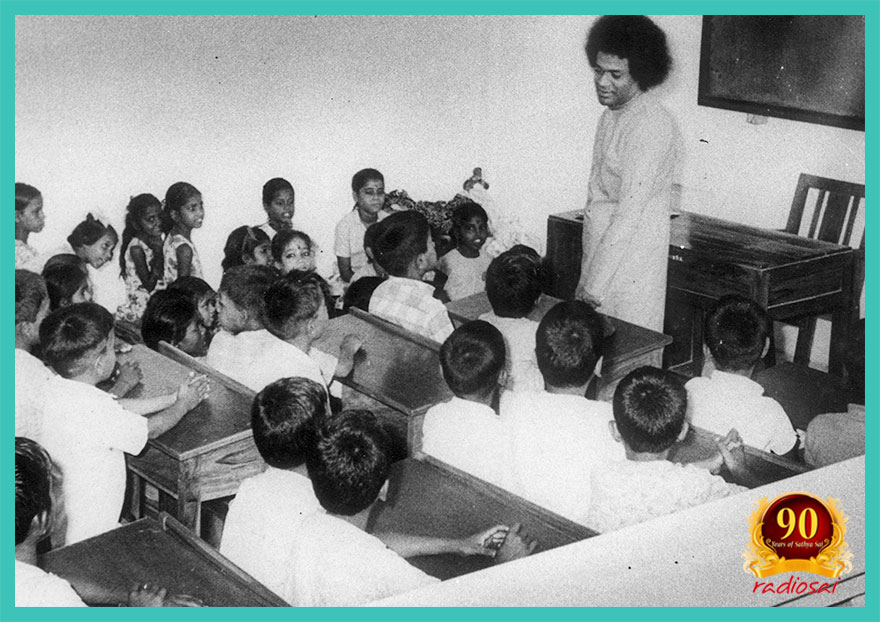 |
There is much debate on the examination system and the processes used for evaluation these days, but the point Swami is making is quite significant. In an academic system a lot of information is imparted and it is considered sufficient if a student gathers 35% to 40% of that knowledge. That is, we convey through this system that it would be best if you could learn all that is imparted, but it is good enough to progress to the next level even if you have learnt much lesser. Though this could be considered a good system for academics, it is not quite so for values and spirituality. A student needs to be taught that he or she has to make efforts to perform righteous action every single time. Though one must not give in to low confidence on facing failures or slips in the path, one’s vision must be focussed on perfect idealism. One of the important lessons taught to Bal Vikas children on Bhagawan’s instructions is a fact that a wrong cannot be undone by a good act. Swami would say, you have to reap the fruits of each act you perform, be it good or bad. This message infuses a sense of responsibility in us for every act we perform. Bhagawan probably exhorts that this sense of responsibility must be inculcated in students. Let us now see what Swami has to say in conclusion. Following is the last part of the discourse.
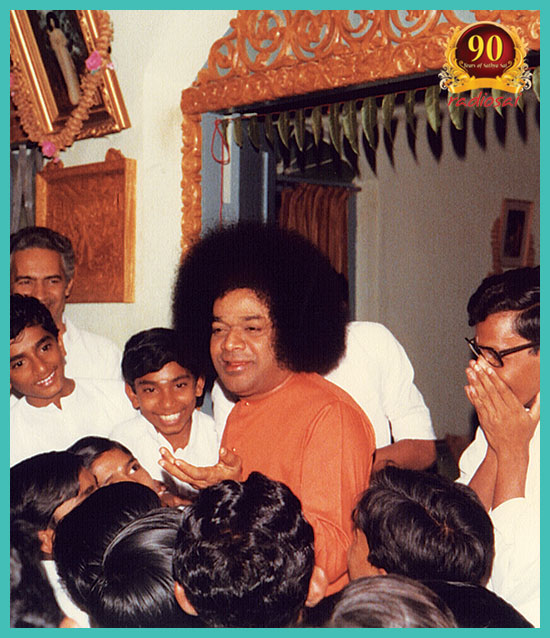 |
Embodiments of the sacred Soul, Teachers, though we are unable to attain that supreme peace (Prasanthi) today, at least if we now impart to the hearts of children the sacred education, we can ensure such bliss in the future, and we must consider this as a Sadhana and make efforts. Today's children are the future citizens of this country. Their hearts have to be considered as a sacred foundation for the future. By this we can certainly achieve this sacredness and purity in future. Teachers should take the efforts to transform the children's hearts into ones filled with love. Having been born as humans, we must do the necessary sacrifice to perform this one pure act at least. So first and foremost we must be prepared for sacrifice (tyaga) and thus give the necessary discipline (yoga) to the children. It is only when there is yoga we will be able to enjoy the bliss in our lifetime. We do not have the yoga but we aspire merely for a job (udyoga). Yoga is of primary importance, udyoga is secondary. We must seek the means to understand and practice the culture of our country. If we impart to the children the history and traditions of our country through good words and pure love, then they will have the enthusiasm and be ready to accept and experience it. Hence it is My desire that you teachers must try henceforth with all the necessary earnestness, without the feeling that they are other's children, to impart the sacred and supreme Truth.
Bhagawan concludes the discourse with almost a plea to teachers and parents to do all it takes to mould students into worthy and noble citizens. This was a discourse Swami delivered in 1975. Ever since Bhagawan’s educational mission has expanded multifold. The Bal Vikas programme has spread to every part of the country and has taken the form of Sai Spiritual Education (SSE) in other countries. What were two colleges, one for women and the other for men has taken the form of an internationally recognised University and we haven't mentioned the over hundred Sai schools run with love by His devotees. This is nothing short of a revolution and looking back we can say that thousands have heard, been inspired and responded to the plea Swami made 40 years ago. But it is for each one of us, especially those playing the role of parents and teachers to sanctify our life by responding to this plea.
We will bring for you in the beginning of the next month, another discourse from the same series.
- Radio Sai Team
What do you think about this Article? Please let us know by writing in to h2h@radiosai.org or you may leave your thoughts in the comments section. Do not forget to mention your name and country.
| comments powered by Disqus |






